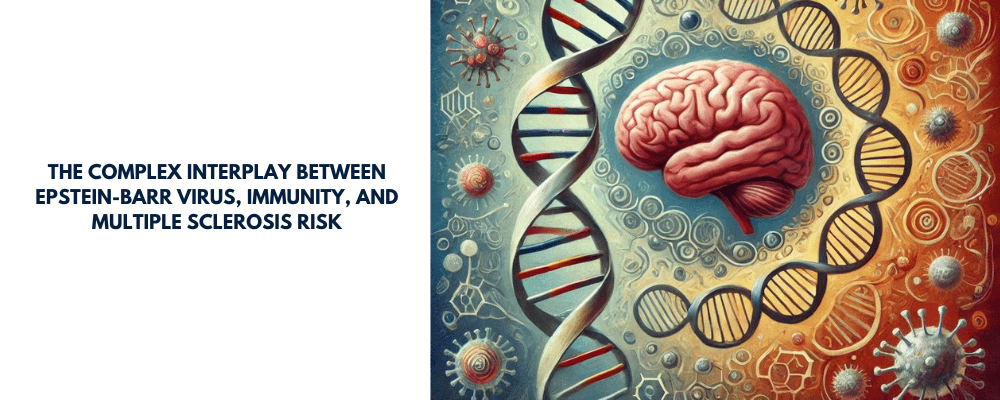The Complex Interplay Between Epstein-Barr Virus, Immunity, and Multiple Sclerosis Risk

Multiple sclerosis (MS) is a complex, immune-mediated, neurocognitive, demyelinating disease of the central nervous system (CNS) with a complex etiology that involves both genetic and environmental factors. One of the most significant environmental factors implicated in MS pathogenesis is infection with the Epstein-Barr Virus (EBV). Despite EBV's ubiquitous presence, only a small fraction of individuals develop MS, suggesting that other factors, including immune responses and genetic predispositions, play crucial roles in determining MS risk. A recent study by Vietzen et al. (2023) published in Cell sheds light on the mechanisms by which ineffective control of EBV-induced autoimmunity increases the risk for MS.
Epstein-Barr Virus and Multiple Sclerosis
EBV is a herpesvirus that infects more than 90% of the adult population globally. It establishes a lifelong persistent infection in memory B cells, with occasional reactivations. While EBV infection is asymptomatic in most individuals, it has been strongly associated with MS development, particularly in those who develop high titers of EBV nuclear antigen 1 (EBNA1)-specific antibodies. These antibodies are known to cross-react with the CNS protein GlialCAM, potentially triggering an autoimmune response that contributes to MS pathogenesis.
Immune Responses and MS Development
The study by Vietzen et al. focused on understanding why only a subset of individuals with high EBNA1-specific antibody titers develop MS. The researchers discovered that individuals who develop MS have impaired immune responses, particularly in their natural killer (NK) cells and cytotoxic T cells, which are critical for controlling autoreactive cells that target GlialCAM.
In healthy individuals, specific NK cell subsets (NKG2C+ and NKG2D+) and EBV-specific T cell responses effectively eliminate autoreactive GlialCAM-specific cells. However, MS patients show a significant reduction in these protective immune responses. The study found that MS patients have a lower frequency of NKG2C+ NK cells and a reduced ability of their NKG2D+ NK cells to mediate cytotoxicity against GlialCAM-specific cells. This impaired immune control allows autoreactive cells to persist and potentially drive the autoimmune processes that lead to MS.
The Role of Viral and Host Genetics
Another critical aspect of this study is the role of genetic variations in both the host and the infecting viruses. The researchers demonstrated that certain EBV variants are more likely to upregulate HLA-E, a molecule that inhibits NK cell activity through the NKG2A receptor. MS patients were found to be predominantly infected with these EBV variants, which likely contribute to their impaired NK cell responses.
Furthermore, the study highlighted the importance of human cytomegalovirus (HCMV) co-infection. HCMV can modulate the immune response to EBV and is associated with the expansion of NKG2C+ NK cells. However, MS patients were less likely to be HCMV seropositive, which could partly explain their reduced NKG2C+ NK cell levels and the consequent lack of effective immune surveillance.
Implications for MS Risk and Potential Therapeutic Approaches
The findings of Vietzen et al. suggest that MS risk is significantly influenced by the interplay between EBV infection, immune responses, and genetic predispositions. The study identified a combination of factors—such as the presence of certain EBV variants, HCMV co-infection, and host genetic polymorphisms—that could help identify individuals at high risk of developing MS.
Moreover, the study opens new avenues for therapeutic interventions. For instance, enhancing NK cell activity or blocking the inhibitory HLA-E/NKG2A axis could be potential strategies to prevent or treat MS. Additionally, targeting EBV or modulating the immune response to prevent the persistence of autoreactive cells may offer another approach to mitigating MS risk.
Conclusion
The study by Vietzen et al. underscores the complexity of MS pathogenesis and the pivotal role of immune regulation in determining the risk of developing the disease. By elucidating the mechanisms by which EBV-induced autoimmunity is controlled—or fails to be controlled—this research provides valuable insights into the factors that increase MS risk and offers potential pathways for novel therapeutic strategies.
Reference:
Vietzen, H., Berger, S. M., Kühner, L. M., et al. (2023). Ineffective control of Epstein-Barr-virus-induced autoimmunity increases the risk for multiple sclerosis. Cell, 186(24), 5705-5718.
